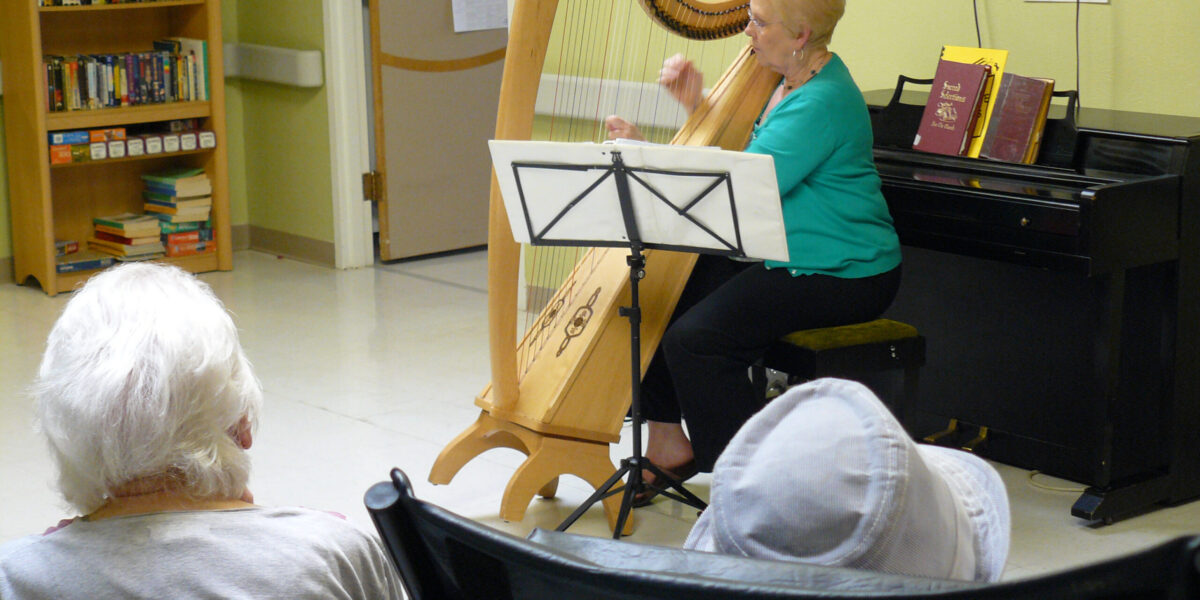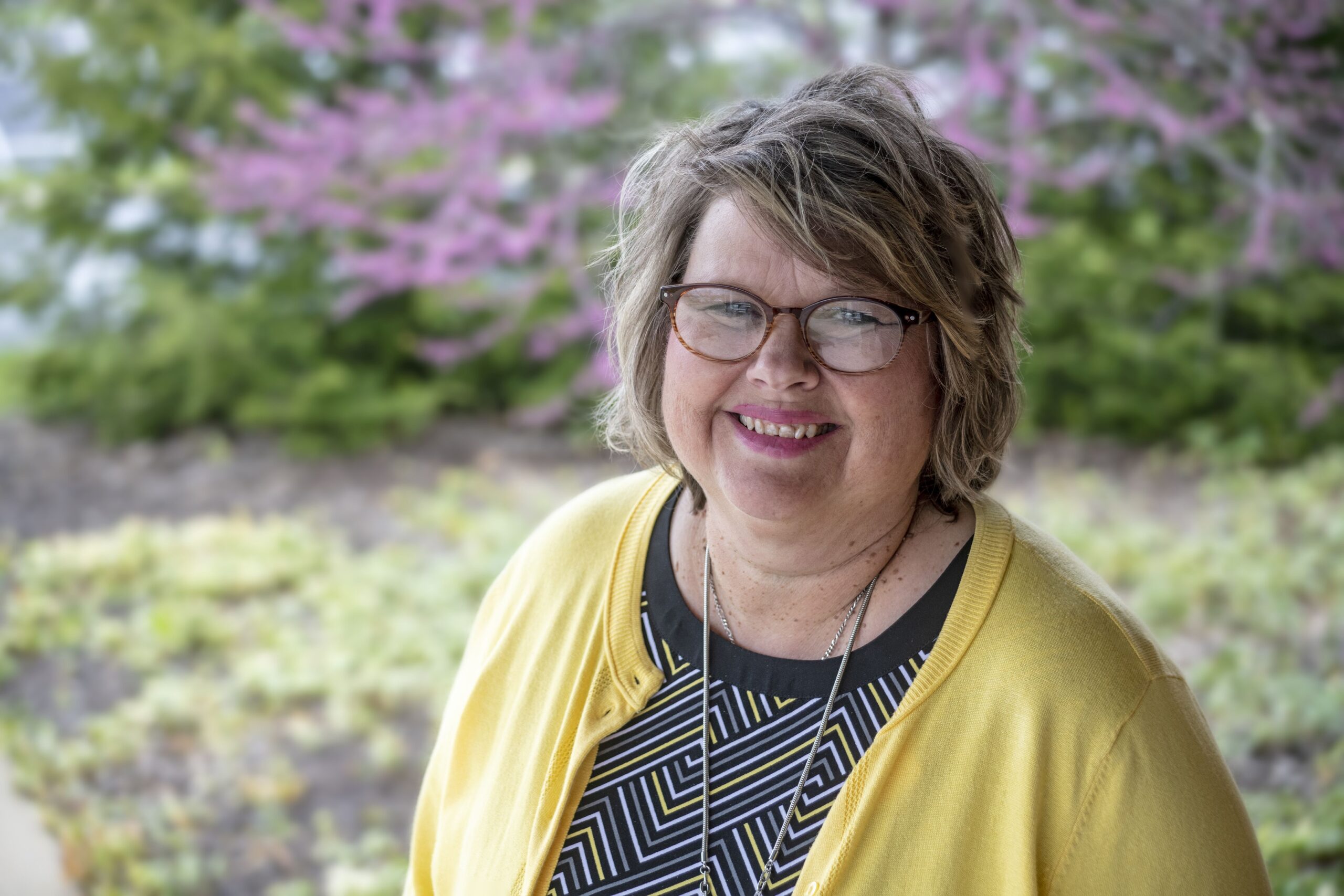NEWTON, Kansas (Mennonite Mission Network) — As Janice Graber strummed "Jesus Loves Me" on the harp for an Alzheimer’s patient in Carlsbad, New Mexico, the woman, having been catatonic for months, lie still.
The woman’s family gathered around; some held her hand, others prayed, waiting for the end.
Suddenly, in the middle of the first verse, the woman began to sing. By the second verse, the unthinkable happened.
"’Jesus Loves Me’ is a magical song, and incredible things happened when I would play it for people who were dying," Graber said. "But this time, I was really shocked. After a few bars of the second verse, her eyes flew open, and she began talking a mile a minute to her family.
"She began voicing her regrets, things she was sorry for, end-of-life stuff. I was dumbfounded, so thankfully my muscle memory kept me going, since I had played this hymn many times before."
Graber, a former nurse, played this hymn often during hospice ministry in Carlsbad. From their base at Carlsbad Mennonite Church, Graber and her husband — LaVerne Graber, a lifetime farmer in Freeman, South Dakota — served with SOOP (Service Opportunities with Our Partners) for 22 years. Together, they have completed many SOOP assignments — he in home repair, and she in women’s shelters and food pantries, as well as hospice.
This year, the retired couple celebrates SOOP’s 30th anniversary with Mennonite Mission Network. SOOP provides short-term service opportunities for retirees, individuals of all ages, and families. The program’s 70 sites span the United States, Canada and Latin America.
Until the COVID-19 pandemic slowed volunteerism, SOOP director Arloa Bontrager and SOOP assistant Stephanie Weaver had been processing up to 200 assignments each year. Volunteer sites range from church camps to inner-city soup kitchens to initiatives reaching out to people pushed to society’s margins.
A variety of these SOOP ministries have drawn in retirees LeRoy and Sherry Mast, of Greenfield, Indiana, over the past decade. For example, the Masts have served with a Navajo community in Farmington, New Mexico, and, most recently, at Pine Lake Camp and Jubilee Mennonite Church in Meridian, Mississippi.
A volunteer highlight for LeRoy Mast, a former Mennonite pastor and conference minister who did home repair for SOOP, was his experience with the spiritual practice of drumming during rehab for people struggling with alcohol addiction, as well as former prison inmates.
"One way the Brethren in Christ mission integrated Navajo tradition into Christian experience was through the practice of singing and sharing parts of their stories, recovery and ongoing struggles, while hammering a big drum," he said. "I felt honored to be trusted enough to be invited into this sacred circle of six to eight men."
Sherry Mast, a former nurse in school and public health settings, who engaged with a variety of tasks with SOOP, said that she found her exposure to cultures different from her own most memorable.
"It is very easy, if you have lived in Indiana all of your life, to think that everyone does things like you do," she said. "By engaging with Black people in the South, I was exposed to a culture I had not experienced before. … And yet, amid cultural differences, in establishing a friendship with a grandmother there, I also realized we shared a similar heart of love for our families."
SOOP name change brings change in scope
In 2010-11, at the 20-year mark of SOOP — which was formerly named Service Opportunities for Older People — Mission Network received feedback from participants about whether the name should be tweaked. Some participants called for dropping the word "older," while others wanted to retain it.
"We held both of these sentiments together, as we discerned how to shape the program for the future," Bontrager said. "In the end, we decided to go with the name change, Service Opportunities with Our Partners]. We wanted to shift from focusing only on our volunteers to also emphasizing the part that our local partners play."
The change in name and scope served to boost the number of retirees drawn to the program. It also drew families and younger adults into its ranks.
One such family — Katrina and Matt Eberly and their four children — braved the new realities of COVID-19 last summer to volunteer at Camp Deerpark, a SOOP site in upstate New York.
Amid an unsafe world, the couple didn’t worry when their children were nowhere to be seen at camp, Katrina Eberly said last summer. They knew they were stretching their bodies and souls in ways that were impossible in the family’s small backyard in Reading, Pennsylvania.
"A high point for me was watching our children run freely in the wide, open spaces and under the stars and among the tall grasses," she said.
Young adults also have taken advantage in the change of scope. For example, when their "Plan A" sabbatical fell through, Matt and Ruth Lehman Wiens forged a "Plan B."
"People plan, and God laughs," quoted Matt Lehman Wiens, when asked about the six-month sabbatical he and his wife, Dr. Ruth Lehman Wiens, had planned for 2020. After she finishing her family medicine residency in June, the couple had intended to serve at Iona Abbey in Scotland for several months.
Because of international travel complications, the McPherson, Kansas, couple,volunteered on the Pikes Peak Massif in Colorado for a month last fall, instead of on the island in the Hebrides.
Partners love SOOPers; and wider church benefits, too
SOOP partnerssaid in recent interviews that they believe Mission Network is at its finest when it seeks mutual partnership. They also note that service partnerships build up the wider Mennonite church.
"We could not run the school if it weren’t for the SOOP volunteers, who have become a very dear part of our community here," said Kay Neff, a leader at Peace Academic Center on the Hopi Reservation in Arizona, "People forget that many years ago, the Hopi asked the Mennonites to come and build a school here, and the SOOP involvement is a part of that long, mutual history."
Matt Graybill, director of Pine Lake Camp, echoed Neff’s affirmation of SOOP.
"The Deep South is not usually a vacation destination for folks, and I so appreciate volunteers who choose to build cross-cultural relationships, as they also get a lot of tasks done," he said. "I really enjoy the friendships developed with people who share their lives and stories with us, and us with them."
Marlin Hershberger, the former SOOP site coordinator in Phoenix, Arizona, believes programs like SOOP are invaluable for building an ongoing legacy of service in the wider Mennonite church, as well as strong personal relationships.
"We’ve had a total of 450 SOOP volunteers serve here, and that tells me that volunteerism is still alive and well in a church that has always valued it," Hershberger said. "Equally important are the friendships that volunteers forge while they are here. Three couples from Indiana, Pennsylvania and Nebraska make it a point to serve together every year here, in Phoenix."
For Janice Graber, the new friendships gained in Carlsbad were equally as profound as her hospice harp-playing ministry. Both aspects keep the Grabers migrating each winter from the plains to the desert — January 2022 will be their 23rd winter serving with SOOP.
"We’ve met some really wonderful people and made many new friends over the years — both with people in the church community and the people onsite," said Graber. "These relationships have been a huge blessing."








